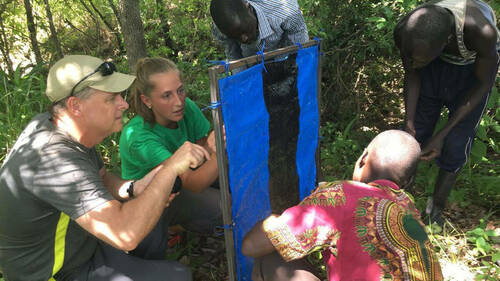
A two-year Master of Science in Global Health program will leverage the University of Notre Dame’s historical strength in infectious disease research to help students solidify interdisciplinary careers that will address health issues worldwide.
The master’s program, which is a partnership among the Eck Institute for Global Health, Notre Dame College of Science and the Keough School of Global Affairs, will begin accepting applications on Aug. 30, with the first class graduating in 2024.
“This program is going to expand the already excellent student research experience at Notre Dame,” said Dr. Bernard Nahlen, director of the Eck Institute for Global Health and professor in the Department of Biological Sciences. “Given the talent and skills among the faculty and their track record in global health, this is going to be a rich environment for students to come into.”
The University previously offered a one-year master’s program in global health. The expansion allows students more time to connect and shape their views of global health within the context of world events — including, but not limited to, upheaval from the COVID-19 pandemic. Additionally, a review of the program showed that expanding it to two years would allow more scheduling availability for international research and time for further coursework.
“The new design of the Master of Science in Global Health program represents an incredibly rich training environment,” said Laura Carlson, dean of the Graduate School and professor of psychology. “It interlaces leadership and ethics into coursework that is then brought to life through students’ individualized research and fieldwork. At Notre Dame, we are driven by the conviction that each student matters, and their research matters. The M.S. in Global Health is a program in which students develop the skills, methods and habits of mind that will make each of them a force for good in the world.”
The expanded program will offer three areas of concentration: vector biology and parasitology, health governance and policy, and health analytics.
“With the two-year program, students will have more time to access a much broader range of courses that will better round out their knowledge of global health,” said Nahlen, who also envisions that the program will be a terminal degree for students specifically interested in careers in global health.
The new program will give students an entire summer to complete their research, and much of the year after to analyze and synthesize their results, said Michael Hildreth, interim dean of the College of Science.
“This new program should make for a much more intensive research experience that will be beneficial for their future careers,” Hildreth said.
Scott Appleby, the Marilyn Keough Dean of the Keough School of Global Affairs, said the partnership with the Eck Institute will allow students from both the two-year program and Keough School’s existing Master of Global Affairs program to graduate better prepared to collaborate with and serve people in a variety of geographical and cultural settings.
“Both the Eck Institute and the Keough School understand that the health of the most vulnerable populations around the world is affected by the physical and psychological pressures associated with poverty and displacement, the Earth’s changing climate and the availability of natural resources, the sometimes inadequate government response to pandemics and plagues, and many other factors,” Appleby said. “So together ours is a holistic, context-specific approach to health and health care.”
Hildreth expects that Notre Dame’s history in vector biology research — research into how organisms, like mosquitos, transmit diseases — will be a draw for students, and Nahlen agrees.
“Notre Dame is developing a best-in-class program that will be the go-to place to get a degree in global health,” he said.
Interested students can learn more about the Eck Institute for Global Health, including opportunities for partial financial support, and may complete their applications through the Graduate School starting Aug. 30.